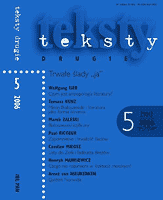Osobowość a anonimowość w "przypowieści" o "rzymskim bruku"
Personality and anonymity in a ‘parable’ about the Roman pavement
Author(s): Arent van NieukerkenSubject(s): Literary Texts
Published by: Instytut Badań Literackich Polskiej Akademii Nauk
Keywords: Norwid; Christianity; God; Subjectivity
Summary/Abstract: The article attempts to show the relationship between the “visible” surface of the world and the Divine according to Cyprian-Kamil Norwid’s interpretation of Christian belief. This relationship is represented against the background of imperial Rome in the second century AD. When one looks at the colourful bustle of the Pagan capital from a Christian point of view, it becomes clear that its bright surface contains an added dimension that reveals itself in the dark (nightscapes) and depth (the catacombs). Thanks to this insight we understand that being is sacred in itself – the Divine is apparent “here and now” on the pavement of Rome. We (the author and the reader) discover (establish) certain tangible and bodily “configurations”: the “rock”-motive, “three” Christians who are persecuted for their refusal to participate in a “feast of the Emperor”, the young anonymous hero who unconsciously becomes a martyr for his belief in an essential humanity of the Divine (and vice-versa – the idea of God-man). Reality appears to us as the realm in which the holy and the profane, immanence and transcendence, time and eternity are intertwined. However, it should not be overlooked that Quidam is a highly ironical poem. From an existential point of view, the author identifies himself with the anonymous “Son of Alexander” (“Quidam”, “Everyman”), whose title character, in his quest for ultimate truth, arrives at acting like a Christian without being aware of his “imitating Christ”. His “sacrificial” identity with the example of God-man is suggested by the “second” Quidam, the “Gardener”, to whom the truth of Christianity had been previously revealed. The gardener is the “ideological” mouth-piece of the author – he lacks a psychological “depth”. The tension between the existential authenticity of a man in search of a not-yet consciously achievable fulfilment (the sacrificial death of Alexander’s son is, as a matter of fact, a form of fulfilment) and the truth as a result of simply accepting the dogma constitutes the essential features of the world of Norwid’s poetry – its meaning is not self-evident, but must be brought into the open by intellectual effort. God’s revelation is put into perspective by individual man.
Journal: Teksty Drugie
- Issue Year: 2006
- Issue No: 5
- Page Range: 136-148
- Page Count: 23
- Language: Polish

